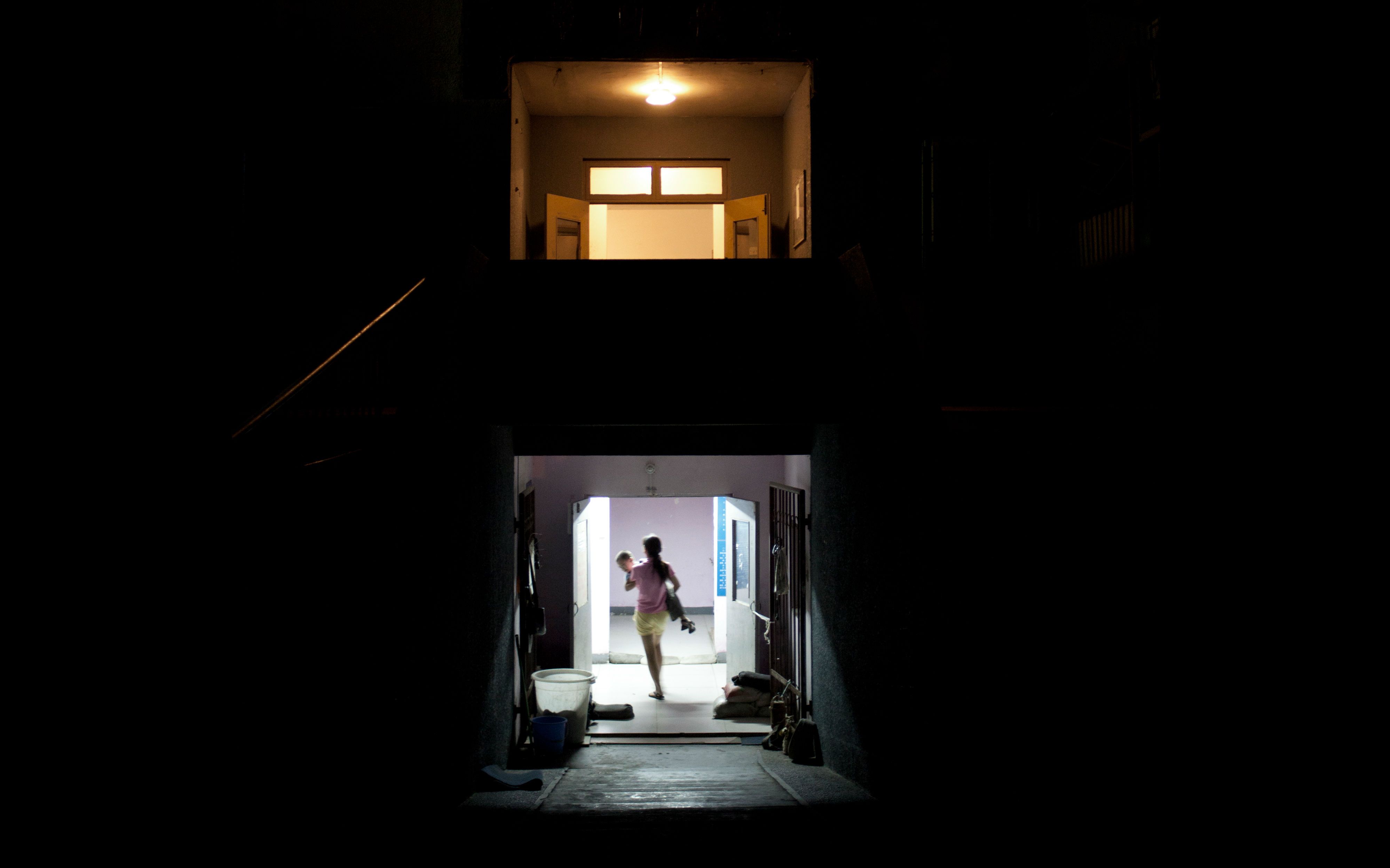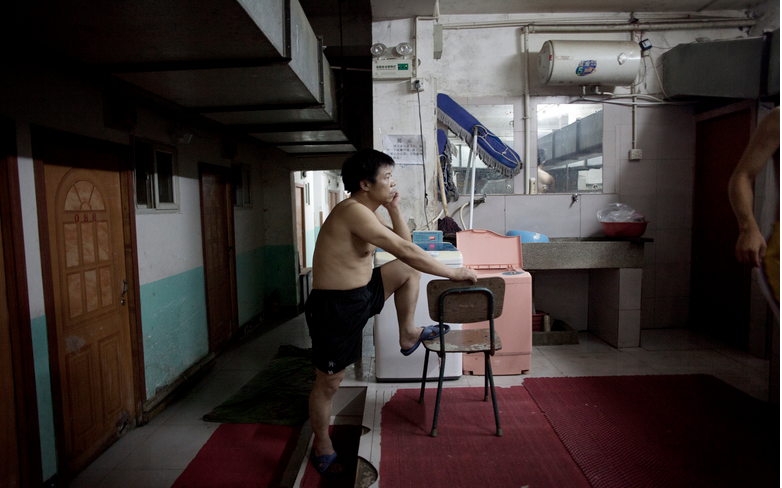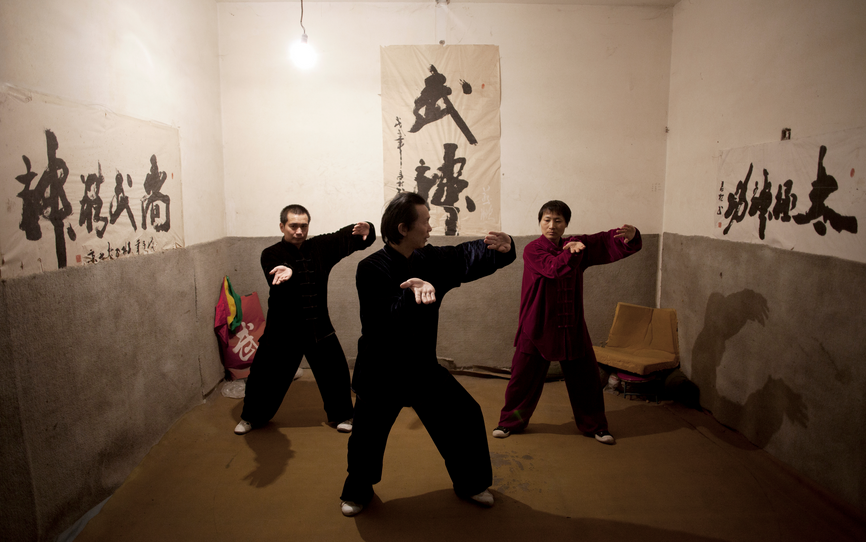With his tidy two-piece suit and over-gelled, gravity-defying hair, Wei Kuan looks like any other young Chinese office worker coming home to a high-rise apartment compound in downtown Beijing. But rather than enter through the building’s front gate, Wei took a long flight of stairs located through an external doorway connected to an apartment block, descending two stories deep into an underground maze of cells that he calls home.
Wei, 27, is an insurance salesman by day. By night, he is a member of the so-called rat tribe, a derogatory term used to describe those who like him are unable to afford apartments in Beijing. They number one million in a city of 21 million and live deep beneath Beijing’s streets: in basements under skyscrapers, hotels, and residential blocks. Those who have never interacted with these people living underground sometimes think of them as low-lifes and criminals who dwell in chaos and squalor, but the basement-dwellers are often simply migrants who throng to Beijing in the hopes of attaining the Chinese dream.
The idea of the Chinese Dream is often associated with President Xi Jinping who, in 2013, addressed the country’s youth and called upon them “to dare to dream, work assiduously to fulfill the dreams, and contribute to the revitalization of the nation.” For most urban Chinese, this dream might entail attaining an upper middle-class life, or getting a prestigious job or education. For migrant workers who flock to the capital to find jobs, this dream often means making enough money to return home, build a new house, put their children through school, and sometimes, set up a small business.
For these underground dwellers, at least for the time being, the dream is much simpler: make a life for themselves and find a place to eat and sleep, even if it means living in small, often dank rooms. As the cheapest housing in all of the city, at 400 to 800 renminbi (roughly $64 to $128) a month, rooms are often around 160 square feet, or smaller, separated from other quarters by a sheet of plywood. The smaller basement compounds contain roughly 20 to 30 room and larger ones hold up to 100 or more. Many come with communal bathrooms and shared kitchens, though some forbid cooking.
The basements are often accessed through thick air-lock doors, which hint at their historical use as air raid shelters. As relations between Russia and China deteriorated during the Cold War, Mao Zedong ordered the Chinese people to “dig tunnels deep” as protection against potential Soviet bombs. Later, under the rule of the pragmatic Deng Xiaoping, the shelters were commercialized. The management of these buildings is a complicated system that involves a number of middlemen. Currently, these shelters are typically owned by either a private building management company or the Civil Defense Bureau and subsequently rented out to Beijingers who then lease the basement compounds to migrants. These migrants put their life savings into renovating the basements to meet fire safety and civil defense requirements in order to rent out the rooms to other migrants.
By the 1980s, these spaces had turned into an underground world in Beijing, made up of 800 hostels, as well as supermarkets, cinemas, and roller-skating rinks. Some underground malls and cinemas still exist but otherwise, these underground amenities have largely disappeared. In the 1990s, the government passed a law making it compulsory that new buildings construct underground civil defense shelters. The basements of residential towers became a flourishing underground housing market in a city where the population has exploded from nine million in 1995, to an estimated 21 million in 2013. A good eight million in Beijing are migrants who, due to the strict houkou or “household registration” system, cannot easily buy property in Beijing.
I first heard about these subterranean compounds several years ago from a small-time businessman who oversees one of the basement dwellings. I was fascinated by the idea of another world beneath the city where I have lived for the past eight years. Since 2011, I’ve photographed the residents of almost 100 rooms in basements all over Beijing.
Most of the ambitious young migrants whom I’ve photographed see their living conditions as a short-term hardship that they must endure in order to succeed in the capital. Some even find their spartan living conditions as a source of motivation. As Wei told me, “Many of my colleagues live above ground, but I think it’s too comfortable. This place forces me to work harder. I’m scared of remaining poor.” Wei was formerly a foot masseur, but put himself through night classes so that he could become an insurance salesman.
Hailing from a small village in the central province of Henan, Wei knows quite a bit about being poor. He dropped out of school at age 14 and was jailed for three years at age 16 for hijacking a taxi. After, he tried to stay on the straight and narrow by working stints as a delivery boy, funeral singer, bathhouse towel boy, and masseur. He is now finally a self-made insurance salesman determined to move up in the white-collar world.
Like his hair, Wei’s spunky attitude embodies the spirit of the “rat tribe.” In my five years of photographing them in Beijing, I have met many Wei Kuans. Not all had as dramatic change-of-life stories, but they had the same zeal to make it big—or at least survive—in the capital.
Zhang Qiuli, 25 when I met her in 2011, is a pedicurist and one of the first basement-dwellers I photographed. She told me, “There’s no real difference between us and the people who live above us in the apartments. We wear the same clothes, our hairstyles are just as funky. The only difference is that they have more money right now. When we can afford it, we will also move upstairs.” In the five years that have gone by, Zhang has indeed moved out and up, into an apartment. She is still a pedicurist, but no one wants to live in a basement room for long.
For the most part, the underground dwellers are a transient community. They lived in what had long been a legal gray zone. For the authorities, the basement housing is considered dirty and dangerous, part of the seedy underbelly of Beijing that they are working to clean up. Beijing has gradually started closing the basement compounds, though it’s difficult to know how many since the government does not issue figures. But a large market still exists for these units since they are roughly half the price of comparable units above ground.
Wei is planning to buy a car and move above ground soon. “I can’t possibly ride a bicycle to discuss financial management with a client who drives a Benz,” he told me late last year. His can-do attitude is unrelenting. “I come home to a basement, yes,” he told me. “I feel that contrast sharply in my mind. But I also feel one has to experience life in order to value the future. When I look back later on, I think I’ll have good memories of my life here in the basement.”







